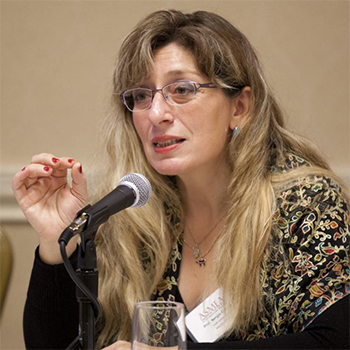York University Professor Nergis Canefe has been selected for a second consecutive year for a fellowship at the Institute of Human Sciences (IWM) in Vienna, Austria – a prestigious institution of advanced study focusing on intellectual exchange across disciplines, between academia and society, and among regions that now embrace the global south and north.
Canefe is a faculty member in York’s Department of Politics, Faculty of Liberal Arts & Professional Studies, a graduate faculty member in LA&PS and Osgoode Hall Law School, and an associate faculty member at Osgoode Hall Law School and the Centre for Refugee Studies.
During her fellowship, she will focus on research examining the societal dimensions of war crimes and mass atrocities in the context of crimes against humanity, such as those witnessed by the decade-long Syrian conflict, the Russian invasion of Ukraine, the Rohingya exodus from Myanmar, and other such human-made catastrophes of the post-Cold War era.
The study, titled “Mea culpa, Sua culpa, Tua Maxima Culpa: Collective Responsibility and Judgment in the Addressing of Mass Atrocities and War Crimes,” explores the problematic aspects of “collective responsibility” in legal morality in tandem with a critical reading of the Husserlian notion of the will, the Arendtian notion of politics and Patočka’s contributions to the debate on responsibility and heritage.

Overall, the project aims to urge the public to consider the limitations of seeking societal peace and political transformation mainly through seeking criminal accountability for the “individual perpetrators” of mass atrocities. It thus has a significant component concerned with the debate on Europe’s Futures and self-image, particularly with reference to the most recent waves of mass crime in its southern and northern neighbours.
IWM normally offers fellowships only once. These are research positions sustained in an environment of active scholarly and intellectual debate of an international calibre, said Canefe.
Canefe’s previous research during her first fellowship at IWG was on “Reflexivity in Forced Migration Studies: Postcolonial, Decolonial and Transnational Methodologies,” which looked at how since the 1970s, forced migration and refugee studies heavily relied upon case studies and suffered from a lack of robust debates on methodological innovations and interventions. Canefe has been serving as a member of the Euro-Asia Platform for Forced Migration in the same institution since 2021.
About IWM
The Institute for Human Sciences (IWM) is an institute of advanced studies in the humanities and social sciences., founded in 1982. It promotes intellectual exchange across disciplines, between academia and society, and among regions that now embrace the global south and north. The IWM is an independent and non-partisan institution. All of its Fellows, visiting and permanent, pursue their own research in an environment designed to enrich their work and to render it more accessible within and beyond academia.
Originally published in YFile.
